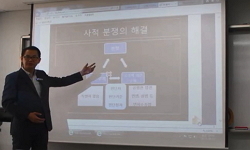The premise of this paper stems from a concern that when a creditor revokes an assignment of claims as a fraudulent act, despite the 'notice' being given to the third-party debtor as a legal means of substantial restoration, the assigned claim is not ...
http://chineseinput.net/에서 pinyin(병음)방식으로 중국어를 변환할 수 있습니다.
변환된 중국어를 복사하여 사용하시면 됩니다.
- 中文 을 입력하시려면 zhongwen을 입력하시고 space를누르시면됩니다.
- 北京 을 입력하시려면 beijing을 입력하시고 space를 누르시면 됩니다.

사해행위로 취소된 양도채권의 원상회복에 따른 제3채무자 보호의 문제 -기판력의 확장을 포함하여- = A substantive and procedural legal issue in case of revoking an assignment of claims as a fraudulent act
한글로보기부가정보
다국어 초록 (Multilingual Abstract)
In cases involving the assignment of claims, the main issues (in my opinion) are related to debtor protection. This is particularly relevant in cases of payment, payment in substitution, and set-off made by the debtor to the assignee under Articles 451(2) and 452 of the Civil Act. The Supreme Court of Korea broadly interprets the scope within which a third-party debtor can assert the effect of set-off against the garnishing creditor, based on the protection of "legitimate expectation of set-off." This raises the question of whether the effect of debt extinction through set-off should be protected when the third-party debtor exercises set-off against the assignee before the creditor rescinds the assignment of claims as a fraudulent act. Therefore, this paper ultimately examines the conflict between the interests of the rescinding creditor and the third-party debtor in relation to res judicata under procedural law.
As a result, it appears that the most appropriate legal principle for extending the res judicata of the first appellate judgment to the rescinding creditor would be the doctrine of 'successor after the conclusion of pleadings' as discussed in the context of the subjective scope of res judicata.
The premise of this paper stems from a concern that when a creditor revokes an assignment of claims as a fraudulent act, despite the 'notice' being given to the third-party debtor as a legal means of substantial restoration, the assigned claim is not effectively restored to the debtor as executable assets. In such cases, the revoking creditor cannot expect any practical effectiveness, as they cannot exercise either the right of subrogation under substantive law or execute monetary claims under procedural law. Therefore, this paper primarily examines how the assigned claims can be restored to the assignor (debtor) as executable assets through the exercise of the right to rescind under substantive law.
In cases involving the assignment of claims, the main issues (in my opinion) are related to debtor protection. This is particularly relevant in cases of payment, payment in substitution, and set-off made by the debtor to the assignee under Articles 451(2) and 452 of the Civil Act. The Supreme Court of Korea broadly interprets the scope within which a third-party debtor can assert the effect of set-off against the garnishing creditor, based on the protection of "legitimate expectation of set-off." This raises the question of whether the effect of debt extinction through set-off should be protected when the third-party debtor exercises set-off against the assignee before the creditor rescinds the assignment of claims as a fraudulent act. Therefore, this paper ultimately examines the conflict between the interests of the rescinding creditor and the third-party debtor in relation to res judicata under procedural law.
As a result, it appears that the most appropriate legal principle for extending the res judicata of the first appellate judgment to the rescinding creditor would be the doctrine of 'successor after the conclusion of pleadings' as discussed in the context of the subjective scope of res judicata.
동일학술지(권/호) 다른 논문
-
타인의 기망행위에 기한 의사표시의 취소 - 대법원 2005. 5. 27. 선고 2004다43824 판결 검토를 중심으로 -
- 조선대학교 법학연구원
- 백승국
- 2025
- KCI등재
-
- 조선대학교 법학연구원
- 윤세교
- 2025
- KCI등재
-
저작물에 대한 접근의 중요성에 대한 소고- 미국 판례 분석을 중심으로-
- 조선대학교 법학연구원
- 김도경
- 2025
- KCI등재
-
- 조선대학교 법학연구원
- 김권식
- 2025
- KCI등재




 KCI
KCI 스콜라
스콜라



